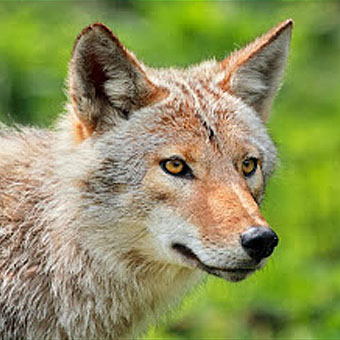I just saw a scraggly coyote in front of my house this morning- the second coyote sighting in my neighborhood this week. I feared what could have happened if my 15 pound terrier was outdoors alone. Wildlife is beautiful, but when my little terrier, Boss, is in harm’s way- my doggie momma protective instincts kick in. While not a threat to be exaggerated, the coyote nonetheless poses a risk to our pet’s safety.
Coyotes are increasingly becoming a concern in urban areas- some are displaced by the urban sprawl that consumes their potential habitat. But other coyotes become urbanized- savvy to living, feeding and thriving within city environments. Coyotes are born opportunists and dine on what they find available. They eat small animals like rabbits and rodents, but also consume ample vegetable matter with up to 40% of their diet consisting of seeds, grasses, fruits and flowers.
The most serious coyote concern for pets is injury and predation. As a veterinarian I can recall many a client whose pet was brought in injured by unknown wildlife or whose cat just one day reportedly just vanished. While many might believe their cat was stolen, in reality these cats most likely fell victim to coyote predation. Likewise small to medium sized dogs can be injured or lost to the same fate as their feline counterparts.
Steps to Keep Your Pet Safe
Whether you have pets or not, it’s important not to feed coyotes. Intentional feeding of coyotes makes them dependent on humans and less fearful which increases the chance of an unwanted, dangerous interaction with people or pets. Just leaving unsecured garbage is invitation enough for these opportunists. Secure all garbage in closing containers and avoid leaving bagged garbage at the curb overnight. Pick up uneaten pet food as soon as your pet has finished eating.
Pet owners should take precautions to keep their household pets protected as well. Keep cats indoors and maintain all pets on leash control when outdoors. Ensure your dogs and cats are up to date on their rabies vaccines. Even indoor cats that do not venture outdoors should be current on this vaccine for both pet and human safety.
Besides rabies, keep your pets current on other vaccinations, deworming and preventatives as recommended by your veterinarian. Coyotes are known to harbor carry skin mites, canine distemper virus, canine parvovirus, adenovirus, and heartworm disease. So even if your dog never leaves your yard, there is potential for infectious disease crossover between wildlife and your pet.
These wild canids are masters at adapting to their changing world, and it’s unrealistic they are going away on their own. As humans we are the ones that need to change to make urban areas less appealing, removing easy feeding sites, and by raising awareness to the potential crossover between wildlife and pets.
For more information about coyotes visit the Nevada Department of Wildlife- Coyote Info

